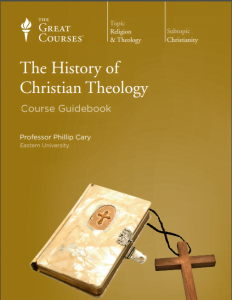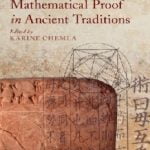History of Christian Theology PDF Professor Phillip Cary is Director of the Philosophy Program at Eastern University in St. Davids, Pennsylvania, where he is also a Scholar-in-Residence at the Templeton Honors College. He earned his B.A. in both English Literature and Philosophy at Washington University in St. Louis, then earned an M.A. in Philosophy and a Ph.D. in both Philosophy and Religious Studies at Yale University.

The History of Christian Theology Pdf
This course surveys major developments in the history of Christian theology, which is the tradition of critical reasoning about how to teach the faith of Christ. Taking the centrality of Jesus Christ as the distinctive feature of Christianity, it focuses on theological concepts by relating them to Christian life and experience, including especially practices of worship.
The course begins with the first Christian theological writings, the books of the New Testament, the earliest of which, the letters of Paul, react a worship of the exalted Christ at the right hand of God, in light of which later documents, such as the Four Gospels, tell the story of the historical Jesus, his earthly life, death, and resurrection.
The course proceeds to examine the theology of the early church, how it read the Jewish scriptures and how it used Greek philosophy, as well as how the very idea of official Christian doctrine and its opposite, heresy, arose in response to the large variety of early Christianities. The survey of ancient Christian theology concludes in Part I by presenting three key doctrines: Trinity, Incarnation, and grace. Part II covers medieval and Reformation theology.
Read Also: Sumitranandan Pant
The distinctive features of Eastern Orthodox theology are discussed, including the use of icons, the theology of the Transfiguration, the distinction between divine essence and energies, and the disagreement with the Western churches about whether the Holy Spirit proceeds from the Father “and the Son.”
Key developments in medieval Catholicism are examined, including scholastic theology, the use of logic and analogy, the seven sacraments, and the soul’s existence in heaven, hell, or purgatory in the time between death and resurrection.
Reformation theology begins with the doctrine of justi¿ cation by faith alone and the Lutheran distinction between Law and Gospel, followed by the Reformed tradition and the development of Calvinism, with its distinctive commitment to the knowledge of eternal salvation, from which allows its embrace of the doctrine of predestination.
Disclaimer:- Dev Library is not the owner of the books and neither it creates books. We just provide the links of the book for the rural and poor students who don’t afford to buy books. Those E-Books and Pdfs are already available on the internet. For any reason, if someone thinks that I’m violating any laws or if anyone has any issues regarding this, please feel free to Contact Us.

Hi, I’m Dev Kirtonia, Founder & CEO of Dev Library. A website that provides all SCERT, NCERT 3 to 12, and BA, B.com, B.Sc, and Computer Science with Post Graduate Notes & Suggestions, Novel, eBooks, Biography, Quotes, Study Materials, and more.








